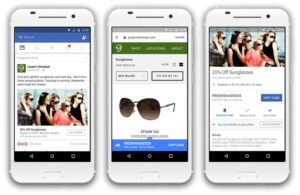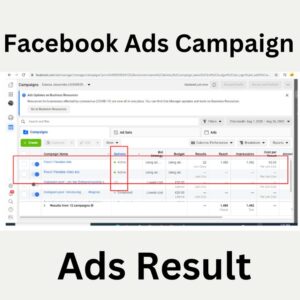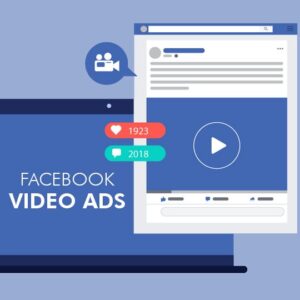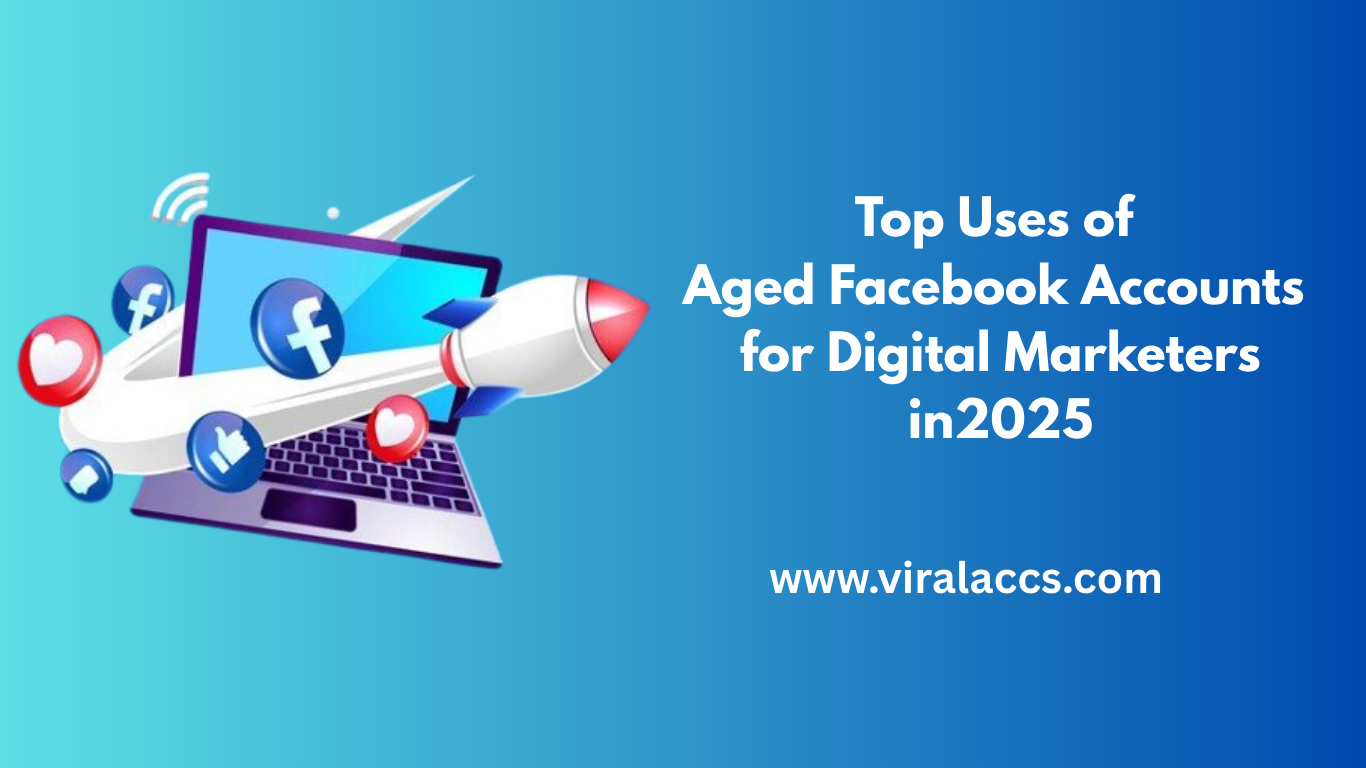Discover the top uses of aged Facebook accounts for digital marketers. Learn how Facebook accounts for ads can improve trust, reduce bans, and boost ad performance.
In the ever-evolving world of digital marketing, aged Facebook accounts have become a powerful asset for advertisers looking to gain a competitive advantage. As Facebook tightens its ad policies and increases scrutiny over new accounts, seasoned marketers are turning to aged profiles to launch and scale their campaigns effectively. But what exactly makes these accounts so valuable?
In this article, we’ll explore the top uses of Facebook accounts for ads and how leveraging aged profiles can give your digital marketing efforts a serious boost.
What Are Aged Facebook Accounts?
Aged Facebook accounts are profiles that were created years ago and have a consistent history of activity. Unlike new accounts, aged ones have already built up trust with Facebook’s algorithm. They may have past interactions, friends, verified details, or even page management history. These factors make aged accounts far less likely to trigger security reviews or ad rejections.
Why Aged Facebook Accounts Matter in Digital Marketing
When launching Facebook ad campaigns, one of the most significant challenges digital marketers face is building trust with Facebook’s algorithm. Facebook’s artificial intelligence (AI) is designed to detect and flag suspicious activity, especially from new accounts that lack a history of interactions. This can result in several obstacles for advertisers, including:
- Restricted Ad Delivery: Facebook may limit the reach of ads from new accounts, assuming they might be spammy or suspicious. This can result in ads not being shown to as many users or not performing optimally.
- Sudden Account Bans: New accounts often face the risk of being banned or suspended by Facebook’s automated system due to perceived violations of ad policies. This can happen even if the ads comply with guidelines, simply because the system sees the account as high-risk.
- Long Review Times for Ads: New accounts typically experience longer waiting times for ad approvals. Facebook scrutinizes newer profiles more closely, which can delay the launch of campaigns and affect marketing timelines.
Using aged Facebook accounts helps digital marketers bypass many of these hurdles. Here’s why:
- Higher Ad Account Trust Scores: Aged accounts have built a solid reputation over time, which means Facebook’s AI trusts them more. This trust allows marketers to run ads without worrying as much about limitations or delays.
- Reduced Risk of Bans: With an established history of activity and interaction, aged accounts are less likely to be flagged or banned by Facebook. This reduces the overall risk of having an account suspended or restricted mid-campaign, ensuring smoother operations.
- Faster Ad Approvals: Since aged accounts have a proven track record, Facebook is more likely to approve ads quickly. This saves valuable time, especially for campaigns that require quick execution.
- Easier Access to Facebook Business Manager: Aged accounts are often granted easier access to more advanced features within Facebook Business Manager, such as setting up multiple ad accounts, creating custom audiences, and managing larger budgets. This makes it easier for marketers to scale their campaigns and manage various aspects of their business effectively.
By leveraging aged Facebook accounts, digital marketers can enhance their ad campaign reliability and avoid the common pitfalls that come with new accounts. This stability leads to more effective and efficient advertising efforts.
Top Uses of Facebook Accounts for Ads
Aged Facebook accounts are an invaluable asset for digital marketers. These accounts, due to their history and trustworthiness, provide several advantages when it comes to scaling ad campaigns. Let’s explore the top ways aged Facebook accounts can be used to optimize your advertising strategy:
1. Running High-Budget Campaigns
One of the challenges with new Facebook accounts is the risk of being flagged or restricted when attempting to run high-budget ad campaigns. New accounts are often considered high-risk, and Facebook’s algorithm may limit their ability to handle large budgets, fearing potential misuse. Aged Facebook accounts, however, come with an established reputation, making them more trustworthy in the eyes of Facebook’s AI. As a result, marketers can confidently start with larger daily budgets and scale campaigns much faster without encountering the same restrictions or delays typically associated with new accounts.

2. Testing Ads without Delays
For marketers who frequently test multiple creatives, headlines, or targeting options (A/B testing), new accounts can be a source of frustration due to long approval times. Each test often requires waiting for Facebook to approve ads, which can result in significant delays. Aged accounts benefit from a smoother, faster approval process because they’ve already built trust with Facebook’s algorithm. This makes A/B testing much more efficient, allowing marketers to experiment with different ad formats, targeting strategies, and creatives without the typical slowdowns. The faster approval process ensures a steady flow of new ad variations into the market, speeding up optimization and improving campaign performance.

3. Managing Multiple Niches
Many digital marketers juggle campaigns across different industries or niches. One of the challenges they face is the risk of a disapproved ad affecting multiple campaigns or business accounts. With aged Facebook accounts, marketers can easily separate ad campaigns by niche or industry, reducing the risk of a single rejected ad impacting the entire portfolio. By creating distinct accounts for each niche, you can focus on creating targeted campaigns for specific audiences while keeping the integrity of your other campaigns intact. This approach ensures that issues in one niche do not disrupt the overall marketing strategy.
4. Bypassing the “Warm-Up” Phase
New Facebook ad accounts typically undergo a warm-up phase, where they are gradually allowed to run ads. During this period, Facebook places restrictions on new accounts to ensure they don’t violate advertising policies. This can lead to a slow start for marketers, especially those looking to scale their efforts quickly. With aged accounts, however, the warm-up phase is usually bypassed because the account already has a history of positive engagement and a proven track record. Marketers can immediately start running full-scale campaigns without having to wait for the account to be trusted by Facebook, saving time and maximizing the return on investment (ROI) right from the start.
5. Creating and Managing Business Managers
For agencies or digital marketing professionals managing ads for multiple clients, Facebook’s Business Manager is an essential tool. However, new accounts often face challenges when it comes to creating or managing multiple business accounts within Business Manager, due to limitations imposed by Facebook. Aged facebook accounts have the benefit of easier access to Facebook Business Manager, allowing marketers to create and manage multiple ad accounts, business pages, and clients from a single interface. This functionality is especially useful for agencies or freelancers who manage diverse clients and need a streamlined way to handle multiple accounts. Aged accounts also provide an additional layer of security and reliability when managing high volumes of ads.
How Aged Accounts Improve Ad Stability and Reach
One of the most significant advantages of using aged Facebook accounts in digital marketing is their ability to improve both the stability and reach of your ad campaigns. Aged accounts typically outperform new accounts in several key areas, including ad relevance, reach, and access to advanced features, all of which contribute to more successful and consistent campaigns.
1. Higher Ad Relevance Scores
Facebook’s algorithm uses various signals to determine how relevant an ad is to its intended audience. A major factor in this process is the ad relevance score, which impacts how often and how widely your ads are shown. Aged facebook accounts generally enjoy higher ad relevance scores compared to new accounts. This is because they have an established history of positive engagement, such as likes, comments, shares, and ad interactions.
Since Facebook’s algorithm has had more time to track the behaviour of an aged account, it’s more likely to trust the activity associated with that account. This trust results in better ad performance, as the platform is more confident that your ads are aligned with its users’ preferences. With a higher ad relevance score, your ads are shown to a more targeted and receptive audience, increasing the chances of engagement and conversion.
2. Improved Initial Reach
When launching ads, aged facebook accounts often see better initial reach compared to newer accounts. New profiles usually have limited interaction history, which means they can face difficulties getting their ads shown to a broader audience in the auction system. Facebook tends to scrutinize new accounts more heavily, resulting in restricted ad delivery and lower reach, especially if the budget is larger or the ad content is deemed high-risk.
On the other hand, aged facebook accounts benefit from a history of consistent activity that helps improve their initial reach. Facebook’s algorithm is more inclined to give these accounts a fair chance in the ad auction, meaning that ads from aged accounts are more likely to be distributed to a larger and more relevant audience from the outset. This translates to more impressions, engagement, and ultimately, a better return on investment (ROI) for your campaigns.
3. Access to Advanced Features
Another significant advantage of aged accounts is the ability to access features that are often unavailable to new accounts. Some of the most valuable features include:
- Custom Audience Creation: Aged accounts typically have access to creating custom audiences based on previous interactions, website visits, or engagement with past ads. This allows for hyper-targeted ad campaigns, ensuring that you’re reaching the most relevant potential customers for your business.
- Pixel Integration without Delay: Aged accounts can quickly integrate and utilize the Facebook Pixel to track user behaviour across websites and improve ad targeting. New accounts, however, often experience delays or issues with pixel integration, which can hinder their ability to retarget users or track conversion events accurately.
- Higher Spending Thresholds: Facebook sets spending thresholds for new accounts, often limiting how much can be spent on ads initially. Aged Facebook accounts generally have higher spending limits, which is beneficial for marketers looking to scale campaigns quickly without running into spending caps or payment issues. This increased flexibility enables more efficient ad scaling and faster campaign optimization.
4. Stability and Consistency in Ad Performance
The combination of higher relevance scores, improved reach, and access to advanced features all contributes to more stable and consistent ad performance. Aged accounts tend to experience fewer disruptions in ad delivery, meaning your campaigns are less likely to encounter delays, ad rejections, or sudden suspensions. With the platform’s trust in the account’s activity, advertisers can maintain a consistent presence on Facebook without worrying about interruptions.

Risks and Best Practices When Using Aged Facebook Accounts
Aged Facebook accounts offer many benefits for digital marketers, but they must be used carefully to avoid potential issues that can lead to account suspension or permanent bans. Improper handling of these accounts can trigger Facebook’s security systems, which are designed to detect suspicious behaviour. To minimize the risks and maximize the benefits, marketers should follow certain best practices:
1. Avoid Sudden Changes in Activity, Location, or Login Devices
One of the most common triggers for Facebook’s security checks is sudden or unusual changes in activity patterns, login locations, or devices. For instance, if an account that has historically been used in one geographic location suddenly starts logging in from a different country, or if the account starts engaging in behaviours that seem inconsistent with its previous activity, Facebook may flag the account for review.
To prevent this, it’s important to maintain consistent activity on the account. If you need to make changes, such as using a new device or logging in from a different location, do so gradually. Sudden shifts in account behaviour are one of the fastest ways to raise suspicion and trigger account suspension or additional security checks.
2. Verify Account Authenticity When Purchasing
When purchasing aged Facebook accounts, authenticity is critical. There’s a significant risk of buying fake accounts or accounts controlled by bots, which not only can perform poorly in ad campaigns but also pose a serious risk to your business. Facebook actively monitors accounts that exhibit unnatural behaviour or appear to be fake, and these accounts can quickly be flagged, suspended, or banned.
To reduce this risk, always verify the authenticity of the account before purchasing. Choose reputable vendors who provide accounts with real activity, verified personal information, and a clean history. Avoid purchasing accounts from untrustworthy sources that might be selling compromised or fake accounts that could lead to your ads being flagged or accounts being suspended.
3. Warm up Inactive Accounts
If you’re using an aged account that has been inactive for a while, it’s important to warm it up before diving into full-scale ad campaigns. Facebook’s algorithm is designed to monitor how accounts engage with content over time, and accounts that have been dormant may trigger security flags when they suddenly start performing high-activity actions such as running ads or interacting with many posts.
To properly warm up an inactive account, engage in natural activities first, such as liking posts, joining groups, commenting, and gradually building connections. This will help Facebook recognize the account as active and legitimate, reducing the risk of it being flagged for suspicious behaviour. It’s crucial to ease into more aggressive activities, like creating ads or running campaigns, after establishing a natural pattern of activity.
4. Use Unique Proxies for Each Account
Another essential best practice when using aged Facebook accounts is to use unique proxies for each account. Facebook tracks login behaviour by IP addresses, and using the same IP address for multiple accounts can raise red flags, as Facebook might interpret this as an attempt to manipulate or game the system.
To avoid IP conflicts, make sure that each aged account is linked to a unique proxy. This will ensure that Facebook sees each account as originating from a distinct source and can help prevent issues related to account linking or suspensions due to suspicious activity. Using separate proxies for each account also minimizes the risk of account shadowing, where multiple accounts share the same IP and are flagged as potentially fraudulent.
Where to Find Reliable Aged Facebook Accounts
With the growing demand for aged Facebook accounts in digital marketing, it’s essential to find a reliable source for these accounts to ensure smooth and effective campaign management. However, not all sellers provide trustworthy accounts. It’s crucial to look for providers who adhere to specific criteria to avoid issues such as account bans, restrictions, or poor performance. Here’s a guide to finding reliable aged Facebook accounts:
1. Look for Verified, Aged Accounts with Login Guarantees
When purchasing aged accounts, verification and login guarantees are crucial factors. Reliable providers will offer accounts that have a verifiable history of activity, which helps avoid the risk of acquiring fake or inactive accounts. These accounts should come with guarantees that the login credentials are correct and functional, ensuring that you won’t run into problems accessing the account. Accounts without these guarantees are often untrustworthy or may be compromised, leaving you with unusable assets.
Make sure that the provider you choose offers accounts with a clean history and consistent activity. Verified accounts that have been active for several years with a history of engagement are more likely to pass Facebook’s algorithm scrutiny and be effective for advertising purposes.
2. Seek Providers Who Offer Country-Specific Accounts
In some cases, you may need country-specific aged accounts to target audiences in particular regions. Facebook’s algorithm can track the location from which an account is accessed and often places restrictions on ads or accounts that don’t align with regional standards or behaviours. For example, if you’re running ads aimed at a European audience, using an account that is associated with a specific European country can help increase the likelihood of ad approval and reduce the risk of account suspension.
When purchasing, make sure that the provider offers accounts that can match the geographic preferences of your target audience. Reliable sellers often offer accounts that are pre-configured for specific regions, making it easier to manage campaigns tailored to those markets.
3. Ensure the Provider Includes Usage Instructions or Warming-Up Tips
A good provider should not just sell aged accounts but also offer guidance on how to use them effectively. This includes usage instructions for setting up ads and warming-up tips for accounts that have been inactive for a while. Without proper warming up, aged accounts may trigger Facebook’s security checks, resulting in delays, restrictions, or account suspension.
Warming up is particularly important for accounts that have been dormant for some time. The provider should give clear instructions on how to gradually engage with the account, such as liking posts, joining groups, and interacting with content. This approach ensures that the account doesn’t suddenly exhibit suspicious activity that could be flagged by Facebook.
4. Check for a Reputation or Reviews from Other Marketers
A reliable seller should have positive reviews or testimonials from other marketers who have successfully used their accounts. Reviews are an excellent indicator of the provider’s reliability, customer service, and the quality of the accounts they offer. Always check trusted review platforms, forums, or social media groups where marketers share their experiences. Marketers who have bought from reputable providers often share feedback on the quality of the aged accounts, and whether they were able to use them successfully for advertising.
Avoid sellers with no reviews or negative feedback, as this could indicate poor-quality accounts that might lead to issues down the road. Reliable sellers are typically transparent about their offerings and have a track record of providing accounts that perform well in ad campaigns.
5. Avoid Cheap or Mass-Produced aged Facebook Accounts
While it might be tempting to buy cheap aged Facebook accounts, these often come with significant risks. Sellers offering accounts at unusually low prices are often providing mass-produced or low-quality accounts that have been created in bulk. These accounts are often flagged by Facebook’s algorithm as suspicious or fake. In addition, these cheap accounts may have been used for spammy activity, making them more likely to be banned or restricted by Facebook’s AI.
Instead of opting for the lowest price, prioritize accounts from trusted sellers who provide verified and authentic accounts that have a clean history. These accounts will be more stable, less likely to be flagged by Facebook’s AI, and provide a higher return on investment for your campaigns.
Final Thoughts
For digital marketers aiming to scale quickly and avoid unnecessary hurdles, aged Facebook accounts are a game-changing resource. Whether you’re running high-budget ad campaigns, testing creatives, or managing multiple business managers, aged accounts offer the trust and stability you need.
By understanding the proper use and best practices of Facebook accounts for ads, marketers can unlock a new level of advertising potential faster, safer, and more effectively.








